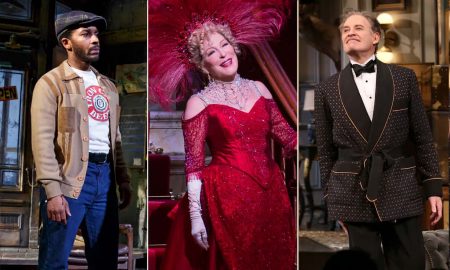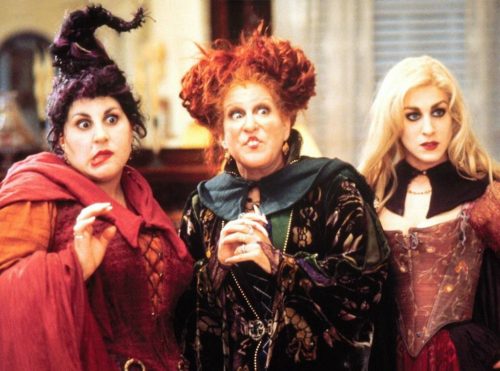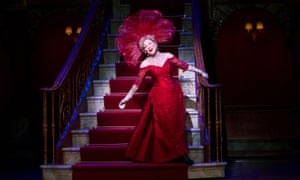The Guardian
Broadway in 2017: box office records broken under the shadow of Trump
Alexis Soloski
Thursday 7 December 2017 07.00 EST
In 2017, Broadway broke record after box office record. But inside the theaters the faces were long and so were the running times. Though rich in new American plays and gussied up revivals, Broadway this year often felt like a letdown, taking fewer risks and reaping fewer rewards. The Laura of Sam Gold’s deconstructed The Glass Menagerie wouldn’t blow out her candles, yet elsewhere the lights seemed dimmer, the costumes less spangled, the orchestra mildly depressed. Blame these blues on the presidential election? Tempting. But most projects secured funding before last November.
A handful of pieces were explicitly political to begin with and became even more political after the inauguration, like Lynn Nottage’s Sweat, a deeply researched meditation on what happens to factory workers in a swing state small town when the factories shutter. The finale of JT Rogers’s Oslo, about a back channel for negotiations between Israel and Palestine, also struck a melancholy note, as the promise of peace receded out of reach of its characters.
If one wanted to escape grim news alerts and social media feeds, other plays offered even less quarter. The London import 1984 provided a violent dystopia that might have resonated more had its leads not been miscast. (Who thinks of Tom Sturridge as humdrum or of Olivia Wilde as drab?) Less violent though often just as frustrating was Michael Moore’s self-congratulatory solo The Terms of My Surrender, notable mostly for baiting the president into a Twitter war. Add “limited run” to the concepts Donald J Trump has failed to grasp. Like Moore’s show, Beau Willimon’s Beltway play, The Parisian Woman, name-checked cabinet members and railed against venality, though the president has yet to tweet a response.
Themes of conflict and disenfranchisement extended throughout other works, like August Wilson’s Jitney, superbly acted, in which unlicensed livery drivers struggle in a changing Pittsburgh, and Arthur Miller’s The Price, in which a beat cop must reckon with his sacrifices. And there were uncomfortable echoes of the people and forces that had put Trump in power in everything from the enjoyably vicious and appetitive antiheroine of Lillian Hellman’s The Little Foxes to the less enticing machers of Ayad Akhtar’s Junk, set in the unregulated Wall Street of the 1980s.
Disillusionment and dashed hopes stalked the characters of The Present (Andrew Upton’s adaptation of Chekhov’s Ivanov), Joshua Harmon’s Significant Other, JB Priestley’s Time and the Conways, Sunset Boulevard, Miss Saigon, M Butterfly, Six Degrees of Separation, even the poignant revival of Sunday in the Park with George.
Groundhog Day, despite its clever lyrics and imaginative stagecraft, seemed freighted with more than its share of existentialist dread and even Bruce Springsteen, in his soloish show Springsteen on Broadway, has reportedly tamped down his customary fire. He wouldn’t allow handclaps in the dark, let alone dancing. (Tickets were so rare and so expensive – another sort of a downer – that my knowledge of these stifled claps is admittedly secondhand.)
Some shows meant to cheer up an audience didn’t fully succeed, like Present Laughter, which boasted a Kevin Kline soigné perfection from the tips of his moustache to the hem of his dressing gown, yet seemed to struggle for hilarity, though it never struggled quite as hard as The Play That Goes Wrong, which couldn’t seem to go quite nearly enough. The musical adaptation of Amélie couldn’t shake its air of preciosity or the pall of its passive heroine and Steve Martin’s iterative Meteor Shower was its own falling star, a comedy in search of a situation.
Several of the more successful shows struck bittersweet notes, like Paula Vogel’s Indecent, an excavation of a forgotten theatrical scandal, and Come From Away, a wispy tearjerker and smile-tugger about a Newfoundland town that housed thousands of travelers in the days after September 11. (Some might add The Band’s Visit and Once on This Island, which I will see in the coming weeks, to this list. The final Broadway shows of that fall, The Children and Farinelli and the King, have yet to open.)
But even a downbeat season has its pleasures and compensations, like the joyful and sumptuous revival of Hello, Dolly! starring a dumpling gobbling Bette Midler and a soaring chorus who make the most of heart-lifters like Put on Your Sunday Clothes. Though its story and characters barely register, the gonzo visual pleasure of SpongeBob SquarePants: The Broadway Musical is extreme, particularly a curtain call of confetti cannon excess and full-bore surreality. New plays like Indecent, Oslo, Sweat and Lucas Hnath’s brainy A Doll’s House, Part 2 provided an embarrassment of American riches.
Performances to treasure included Laurie Metcalf’s devastating, mercurial Nora in A Doll’s House, Part 2, Andy Karl’s dangerously charming Phil in Groundhog Day, Laura Linney’s blissfully avaricious Regina opposite Cynthia Nixon’s heartbreaking Birdie in The Little Foxes, Jake Gyllenhaal’s poignantly distant George and Annaleigh Ashford’s vibrantly present Dot, as well as the expert, responsive ensembles of Jitney and Indecent. And there were smaller moments, too, like the orgiastic dance party of The Present or the inky black evening gown that Cobie Smulders wore in Present Laughter. Or the brilliant beauty of Sunday in the Park’s Chromolume, a reminder that even in grim times there is color and light.







